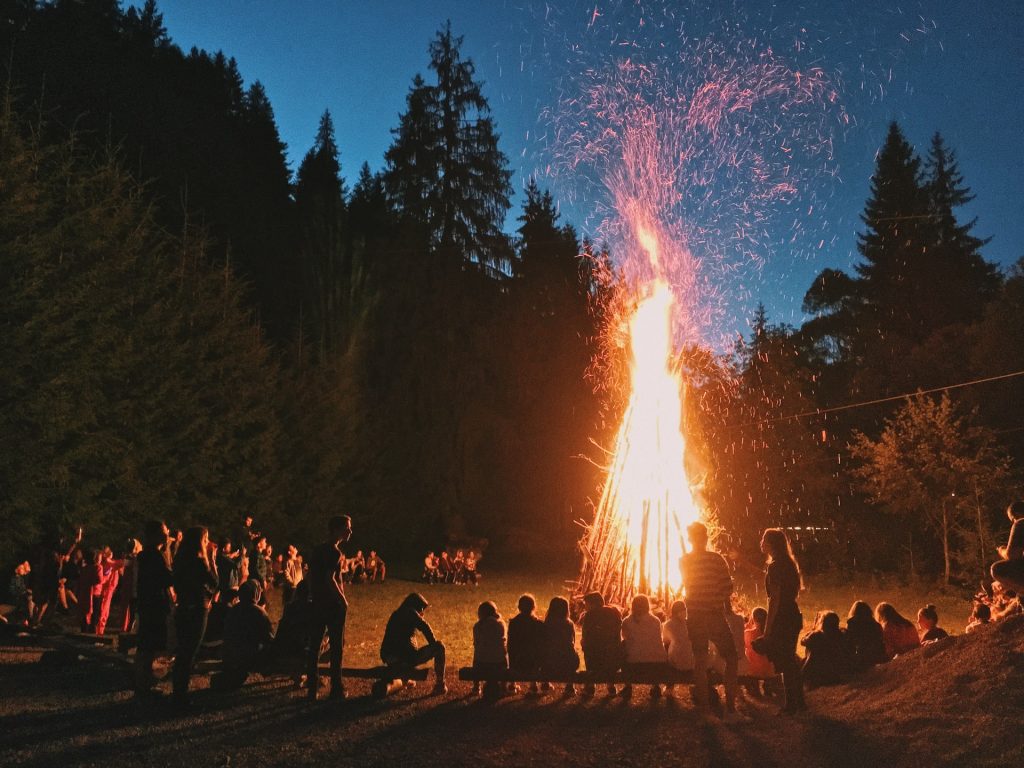Samantha Pederson ended her workday the same way she always did. She closed her laptop, leaned back into her thick, leather chair, and squinted through the blinds of her office window to see the dark red ball of a sun dancing just over the horizon, painting fire into the western sky.
Just then, her watch beeped a message. It was Brian, her ex-husband.
“ETA? Trick-or-Treating starts in 5.”
“Dammit!”
Samantha slammed her laptop into her bag and rushed into the hallway toward the elevator. She’s been so preoccupied with the latest production reports, she lost track of time. Again.
If she hurried, she might still make it to go trick-or-treating with Brian, and her daughter, Sarah. Samantha had missed two piano recitals and one Girl Scout meeting just this month. Sarah never complained. The disappointment in her eyes was all that needed saying.
Samantha’s watch beeped again. This time it was a picture of Sarah wearing the pink princess gown she’d bought last week: the expensive one with the lacy frill. It arrived, along with a tiara and a wand they didn’t order, two days ago with several other Amazon purchases, and Sarah had worn it nonstop ever since, prancing down the hallways, twirling in circles, and giggling as the flounce trailed outward in her wake.
Or so Samantha had been told. This was her ex-husband’s week with their daughter, so she heard about it in fits and spurts through squeals of glee in the evening phone calls.
It was hard not to be jealous. Brian Upchurch and Samantha Pederson (formerly Upchurch) did their best to build a stable, loving environment for their daughter, but where Brian seemed to revel in the mundaneness of everyday parenting, the little things like dancing in the hallway, pretending monsters lived under the couch, and singing children’s songs at full volume so the whole neighborhood could hear always seemed, to Samantha at least, like cleaning out the fridge or mopping the floor; a chore one has to complete, but a chore she wished she could put off more often than not.
As a result, Sarah seemed to giggle louder when she was with her father, laugh harder, play with more reckless abandon. That gulf only widened after the divorce. Sarah seemed to slog through her nights with her mother, then float away on a magic carpet when Brian came to pick her up.
Samantha loved her daughter. She wished she could inspire the same joie de vivre which emanated effortlessly from her ex’s every pore. Brian was in sales. Part of his job meant putting other people at least, making them feel excited, wanted, needed. Samantha was Project Management for Hrbek Financial Services. When doctors had trouble getting patients to sleep with anesthetic, they talked about her work. And, besides, Brain was just more outgoing. She could never command the presence of a room the way he could. It was a simple fact of life Samantha would just have to live with. And that, as her father used to say when he wanted to close an uncomfortable conversation, was all she wrote.
The elevator dinged. The doors opened. Sarah stepped in, pressed the button for the first floor, and waited for the doors to close. She could imagine Sarah twirling in her dress, smiling at her, raising her arms to be held. Another year, and she’d be too big to pick up. And what was after that? MIddle School? Puberty? Graduation? It used to seem so far off, but watching videos of her daughter twirling made Samantha wonder if maybe Einstein was right, that time is relative, and it speeds up when you’re not watching it. Schroedinger’s clocks ticking away at a breakneck pace toward the end of all things.
Just as the elevator door was about to close, a hand reached through to stop if. Following the hand inward was an older man in a slick white suit and a neatly trimmed, grey beard. He looked like Santa Claus if Santa had switched from making toys to managing hedge funds and hostile corporate acquisitions.
He stood in the entranceway, holding the elevator door open.
“Pardon me, M’am, but where is Accounting on this floor? I’ve got some documents I need to drop off and I’d hate to hold it till Monday.”
“Well I doubt anyone’s left in Accounting. I think you and me are the only one’s here.”
“And why are you here so late, little miss? No family to rush home to? No kids going out to beg the neighbors for candy?”
“Excuse me?” Samantha said, clipping her words so tight it’s a wonder they even got out.
“Oh! I’m sorry,” the old man said, stepping back and putting his hand on his chest. “Where are my manners? I was just hoping for a bit of light baner to end the workday. I didn’t mean to touch a nerve.”
Samantha relaxed. “It’s okay. I do have a daughter to get home to, by the way.”
“Oh?”
“Yes. We’re going trick or treating as soon as I get there. She’s dressed as a princess this year. Last year, she was a ninja. She tried to kick everyone on the street. This year, she’s growing into her own.”
“Oh, Dear! I bet that will be wonderful. I do hope you make it home in time.”
Samantha was surprised. She wasn’t usually this forthcoming, especially with strangers. And this man was strange, with his bright white suit and unblinking eyes she could feel staring at her, even when she looked away.
She glanced at her watch.. “Are you coming in or not?”
“Oh my. I misplaced my manners yet again. A thousand apologies, young miss.”
The old man stepped inside, and studied the panel of buttons.
“Let’s see,” he paused, taking his time. “Number three. There she is!” The old man pressed the button, stepped back to admire his work, and then turned to smile at Samantha. “I think we’re ready to go.”
The elevator began its descent. Samantha rested her head against the back wall and closed her eyes. Visions of her daughter began to fill her mind: Sarah dancing in the late autumn air as her bag grew fatter throughout the night, Sarah laughing at the throng of masked children making their way around the neighborhood, Sarah smiling as she twirled into her arms to give her a hug.
“You know, I think little Sarah will be quite a darling in that dress of hers,” the old man said.
“How did you…” Samantha began. “I never told you her name.”
The old man’s eyes stayed on Samantha. She stepped backward, put her bag in front of her, and tried to look away. But his gaze remained, waiting for the right moment.
The right moment to what? Samantha thought, but she didn’t know.
The elevator lurched to one side. Sarah screamed as metal scraped against metal and the left elevator door buckled. The box dropped suddenly, then slammed to a stop at a slight angle. The box light went out and the emergency light came on. The flood light flipped between ten and eleven.
The man in white still stared at Samantha with his unblinking eyes. He took a step closer, arms outstretched toward her. Samantha screamed again and swung her bag. He dodged her swing and stepped back, still staring. Still not blinking.
“Shhh shhh Shh. Let’s not have any of that, dearie. You’ll make this much worse than it has to be.”
Samantha puffed deep breaths of air, almost hyperventilating.
“Make WHAT worse than it has to be?”
“Your choice, my dear.”
“What choice? Who are you?”
The man in white put his hand to his head and smiled.
“I do say. My manners have completely escaped me this evening. I hope you will accept my apology yet again. My name is Lucifer, Satan. Otherwise known as The Devil, although you might know me as Beelzebub, Old Scratch, or even ‘Son of Perdition.’”
“Son of Per…what?”
“Perdition. And I’m with you, Miss Upchurch. I cherish the old names.”
“You’re The Devil.”
“Yes.”
“Satan.”
“Yes.”
“You’re crazy.”
“One hundred percent, m’am, but that doesn’t mean I’m not who I say I am.”
“How do I know you’re not just some crazy person trying to take advantage of me?”
The elevator slipped downward. The deafening sound of metal on metal was almost too much to bear. It sounded like screams. The man in white stood in the center of the elevator. Still smiling. Still not blinking.
“Alright! Alright!” Samantha screamed. “Stop!”
The elevator stopped.
“As to your second question,” the man in white began again, “you, my dear miss Uphurch, have been granted a gift.”
“A gift?”
“Yes. An old friend of mine used to say that most men lead lives of quiet desperation. Same goes for women, too, I’m afraid, because you’ve been desperate for many years, Miss Upchurch.”
“My name is Pederson. Samantha Pederson. I’m divorced.”
“Yes, I know. You moved your family here from Ohio, chasing a prestigious job, then divorced your husband a few months later. You told him things just weren’t working out, right?”
“They weren’t.”
“Did you tell him about your string of lovers? How your late nights at the office often had nothing to do with actual work?”
“I … no.”
“Does he know that you had been fired from your last job, and that this last offer came at just the right moment, enabling you to hide everything from him as you fled to this company and town in Milwaukee?”
“No.”
“Are you aware that your ex-husband still loves you, and do you use that fact to structure a custody arrangement where you share equal time with your daughter, but he pays child support?”
Samantha lowered her head.
“That’s true,” she said. “That’s all true.”
“Well, then, Miss Upchurch. It seems there is a great deal about which you seem to be desperate.”
Samantha said nothing.
“And now you have a choice. See these two buttons here?” The man in white motioned to the elevator panel, where two buttons on the bottom glowed.
“The first one, the one that says ‘Lobby,’ is your ticket home. Press that one, and our little Doom buggy here will right itself and continue it’s merry little path all the way to the bottom floor, where you will walk out, get into your car and continue your life of desperation. I’ll even give you an extra thirty minutes to make it home on time, because I’m such a nice guy.”
“And the other?” Samantha asked.
“The other button …” the man in white began, then the metal slipped and the elevator lurched downward.
“With the other button, things get messy.
“Obviously, I want to choose the first button,” Samantha said.
“Ah, but there are extra considerations.”
“What kind of considerations?”
“Press the second button and it will forever affect your family, Miss Upchurch. Come. Take a look.”
The man in white pulled out his phone and played a video of the Channel 4 News showing firefighters and first responders clearing away rubble and putting out fires at the Hrbek financial building. Samantha watched as paramedics wheeled her body out on a stretcher, covered in a sheet. Brian was there. So was Sarah. They both cried.
“A few weeks later, they will learn the truth of your past,” the man in white said, as the paramedics stopped briefly in front of the ambulance, and then loaded her body in side.
“Their vision of you will change. Their hearts will break.” The devil put his phone away and lowered his head, placing his hands together at his front in a somber pose. “But, your daughter and your husband will know that you truly loved them. That smile you imagined your daughter having as she twirled into your arms? That’s the smile she will have every time she thinks of you for the rest of her life.”
“And if I press the first?”
“You will walk away. Your hidden life will remain hidden. Easy Peasy.”
“What’s the catch?”
“The next person to step into my elevator will meet your fate.”
“Who?”
“Could be anyone. Could be anywhere. MAybe someone you know. Maybe not. Like I said, Life deposits you in many different places. Same deal with my conveyance of destiny here.”
“And my daughter. What will she think of me?”
“Hard to say.” The man in white put his hands in his pockets. “Probably similar to what she thinks now. Only her laughter with her father will likely increase, and you will never truly know how she feels about you.”
Samantha looked at the buttons.
“How old are you, Miss Upchurch?”
“Thirty eight.”
“That’s far too young to die, if you ask me.”
“The next person could be younger.”
“True.”
“And has my life to this point really something you would call ‘living?’”
“You seem to have enjoyed it.”
Sarah continued staring at the buttons.
“What happens if I don’t choose? What then?”
“Oh, I don’t think that’s a wise decision, Miss Upchurch.”
The elevator slipped a few more inches. Loud metal filled the air. The floor designation became a solid ten, then began flipping from ten to nine.
“There isn’t much time,” the man in white said. “I can hold us here for a while, but not forever.”
Samantha flashed her own life through her eyes. All the lies. All the cheating. Her ex-husband’s deflated face when she told him she wanted a divorce. It was possible to build something out of that, right?
She thought of the next person in the elevator. Would they even HAVE a choice? Or would they just fall to their death. So sorry. Game over. That’s all she wrote.
Samantha thought of Sarah. She couldn’t imagine her daughter growing up without a mother. But that smile of hers. It had already begun to fade. How much more could it fade throughout the years if she continued hiding her past?
“Well, Miss Upchurch. I hate to say it, but we’ve reached a decision point. It’s time to eiter cross the Rubicon or let the chips fall where they may. What are we doing?”
Samantha stepped forward and pressed a button.
*** *** *** ***
News vans from several Milwaukee television stations surrounded the first floor of the Hrbek Financial building. The firefighters put out the flames as paramedics dug through the rubble of twisted wires and metal.
“A body!” one of them said. “I’ve found a body!”
They rushed to the back of the twisted heap, throwing away piles of the destroyed wreck.
“She’s alive!” they shouted. “Quick. Help!”
They paramedics lifted Samantha Pederson (formerly Upchurch) onto a stretcher and covered her with a sheet to protect her wounds from debris in the air.
“Samantha? Samantha, can you hear me?”
“He never said I’d die,” she said, coughing the dust out of her lungs in a way that sounded like laughing.. “He said I’d fall, but he never said I’d die.”
“You’re going to be okay, Samantha. Everything’s going to be fine.”
The paramedics wheeled her to the ambulance, where Brian and Sarah waited.
“I don’t think I’m going to make it in time for trick-or-treating,” Samantha said. “I lost the thirty minutes”
“What is she saying?” Brian Upchurch asked the paramedics.
“She’s delusional, probably in a lot of pain.”
“We have some talking to do when all of this is over, Brian.”
“Mommy!” Sarah said, reaching out from her position in her father’s arms to hug Samantha.
“Don’t cry, sweetie, I’m going to be okay. I’m really going to be okay!”
“I love you, Mommy!”
“I love you, too.”
**** **** **** ****
The following year, Sarah dressed as a zombie for Halloween. She’d painted the face on herself, and everyone remarked how realistic it looked. Samantha Pederson, who went trick or treating with her that year, laughed.
The year afterward, Brian and Samantha Upchurch watched as their daughter, who dressed as an Olympic Gymnast who had been decapitated by the uneven bars and was out for revenge, went trick or treating with her friends, each of whom wore similarly grotesque, Olympic costumes. All of them had been designed by Sarah.
She and Brian stole a kiss when the kids weren’t looking, and Samantha thought maybe it was possible to build a life from the mess she had created. So long as she was honest.
For many years afterward, Samantha caught glimpses of the man in white. Once at a Milwaukee Brewers game, eating a hot dog. Another time at a company outing in Madison, sitting at the end of the bar, drinking what looked like a Mint Julep.
She was never sure.
She never saw him up again face to face, however, and for the rest of Samantha Upchurch’s days, she took the stairs whenever possible.
********************************************************************************************
Thanks for joining us on this wild Halloween ride.
If you have the time, please check out the sites for ALL of the Fondue Writers: Joseph Courtemanche, Jamie D. Greening, Kathy Kexel, Derek Alan Elkins, Rob Cely, and Dr. Paul Bennet. If you like what you see, why not pick up a few copies of their books? It covers the cost of everything, and it gives us hope in those long, dark nights when we’re dreaming up new stories, wondering if the monsters in our heads matter only to us, or if one day they might come out of the dark to terrify you as well.
If you’d like what you see, you might also check out our first collection of short stories, The Covid Quarantine Catina, written during the first months of the Covid-19 lockdowns. It’s available in Kindle, Paperback, and Audio formats.
We will be back in a few weeks to bring you some Thanksgiving stories. Until then, always tell the truth, try to avoid elevators, and do your best not to break anything.











